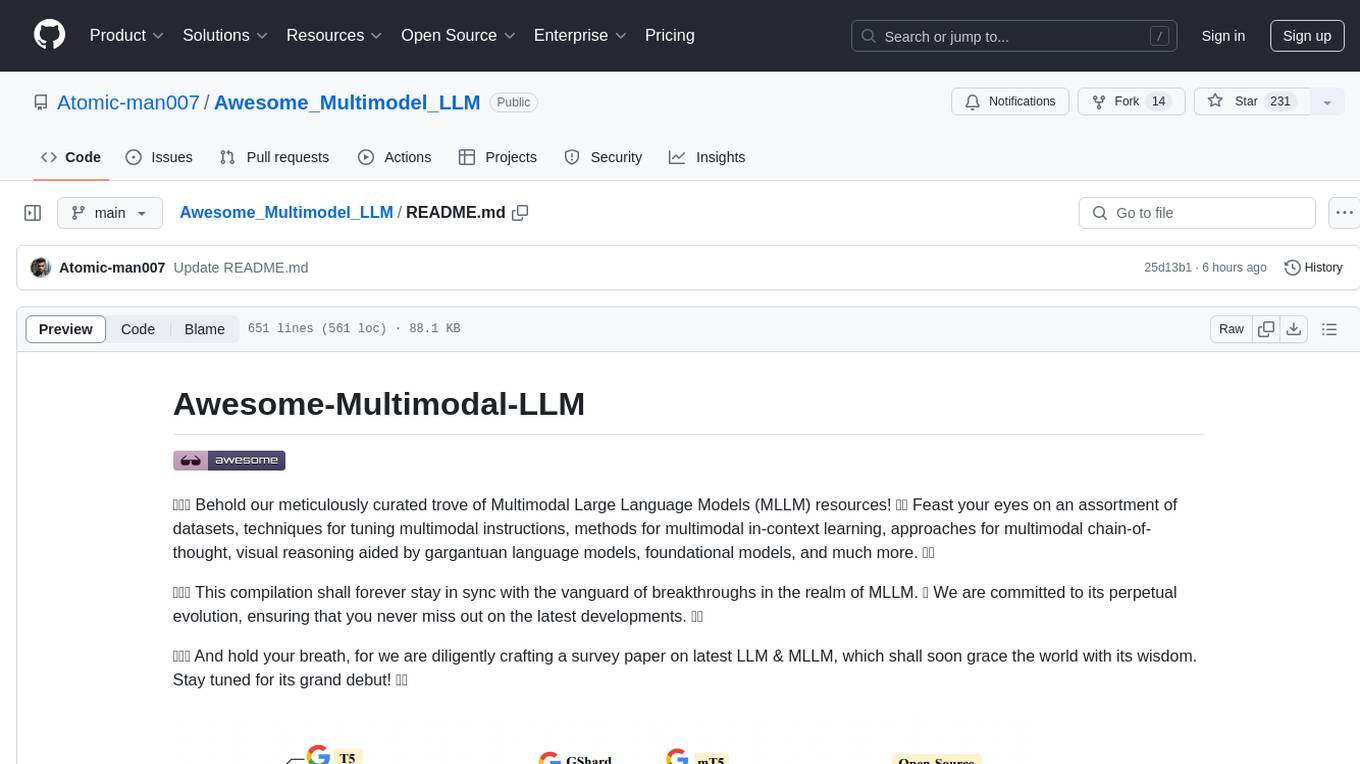
info8006-introduction-to-ai
Lectures for INFO8006 Introduction to Artificial Intelligence, ULiège
Stars: 378
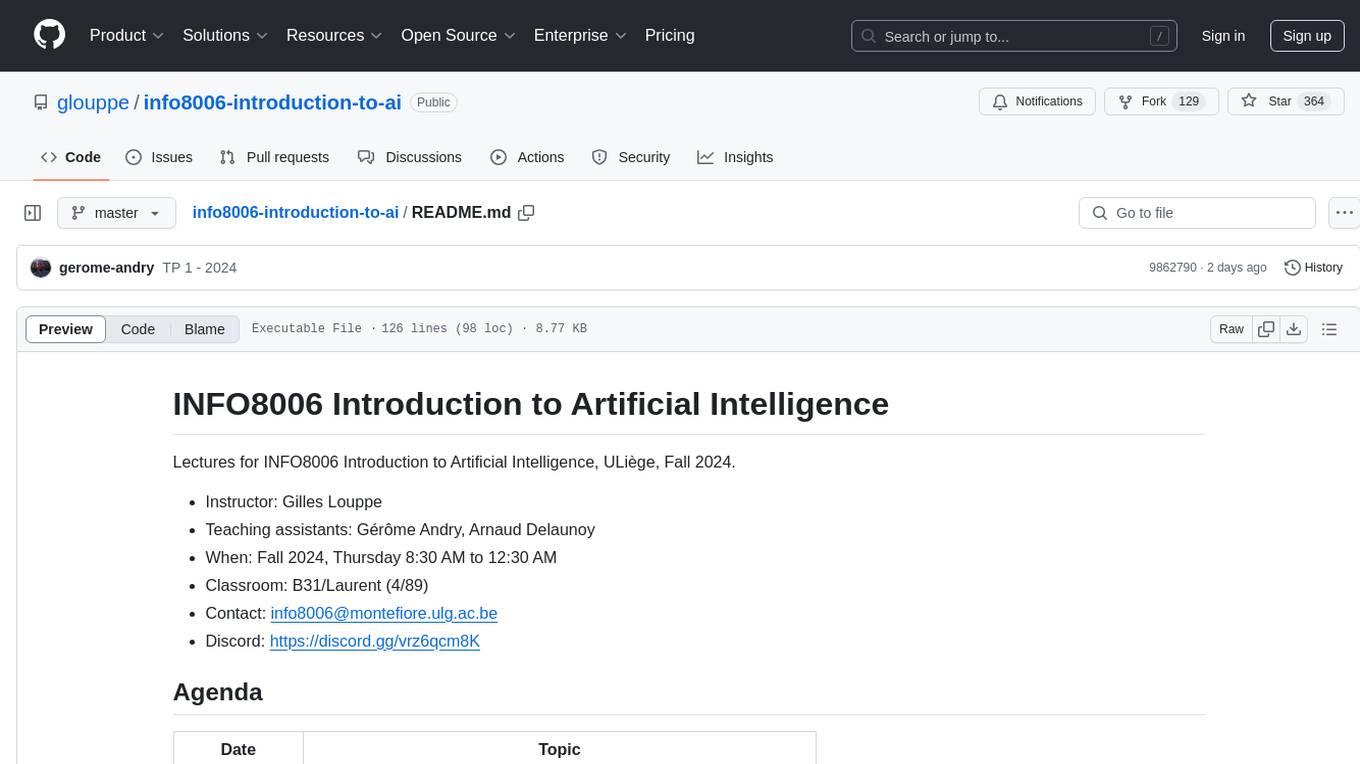
INFO8006 Introduction to Artificial Intelligence is a course at ULiège that covers various topics in AI such as intelligent agents, problem-solving, games, probabilistic reasoning, machine learning, neural networks, reinforcement learning, and decision-making. The course includes lectures, exercises, and programming projects using Python. Students can access course materials, previous exams, and archived lectures to enhance their understanding of AI concepts.
README:
Lectures for INFO8006 Introduction to Artificial Intelligence, ULiège, Fall 2024.
- Instructor: Gilles Louppe
- Teaching assistants: Gérôme Andry, Arnaud Delaunoy
- When: Fall 2024, Thursday 8:30 AM to 12:30 AM
- Classroom: B31/Laurent (4/89)
- Contact: [email protected]
- Discord: https://discord.gg/Y8UP2SBu2h
| Date | Topic |
|---|---|
| September 19 |
Course syllabus [PDF] Lecture 0: Introduction to artificial intelligence [PDF] Lecture 1: Intelligent agents [PDF] |
| September 26 | Lecture 2: Solving problems by searching [PDF] Tutorial: Project 0 |
| October 3 | Lecture 3: Games and adversarial search [PDF] Exercises 1: Solving problems by searching [PDF] [Solutions] |
| October 10 | Lecture 4: Quantifying uncertainty [PDF] Exercises 2: Games and adversarial search [PDF] [Solutions] |
| October 17 | Lecture 5: Probabilistic reasoning [PDF] Exercises 3: Quantifying uncertainty [PDF] |
| October 24 | Lecture 6: Reasoning over time [PDF] No exercises |
| October 31 | No class |
| November 3 | Deadline for Project 1 |
| November 7 | Lecture 7: Machine learning and neural networks [PDF] Exercises 4: Probabilistic reasoning |
| November 14 | Lecture 7: Machine learning and neural networks (continued) [PDF] Exercises 5: Reasoning over time |
| November 21 | Lecture 8: Making decisions [PDF] Exercises 6: Reasoning over time (continued) [notebook] |
| November 28 | Lecture 9: Reinforcement Learning [PDF] Exercises 7: Machine learning |
| December 5 |
No lecture Exercises 8: Making decisions Exercises 9: Reinforcement learning |
| December 8 | Deadline for Project 2 |
| December 12 | No class |
| December 19 | No class |
- General instructions
- Python tutorial [video (Linux), video (Windows)]
- Part 0: Search algorithms (tutorial session in class)
- Part 1: Adversarial search (due by November 3)
- Part 2: Bayes filter (due by December 8)
- January 2019 (solutions)
- August 2019
- January 2020
- August 2020 (solutions)
- January 2021 (solutions)
- August 2021
- January 2022 (solutions)
- August 2022
- January 2023 (solutions)
- August 2023
- January 2024
- August 2024
Materials covered by the exam are listed here.
Due to progress in the field, some of the lectures have become less relevant. However, they are still available for those who are interested.
| Topic |
|---|
| Lecture: Constraint satisfaction problems [PDF] |
| Lecture: Inference in Bayesian networks [PDF] |
| Lecture: Communication [PDF] |
| Lecture: Artificial general intelligence and beyond [PDF] |
For Tasks:
Click tags to check more tools for each tasksFor Jobs:
Alternative AI tools for info8006-introduction-to-ai
Similar Open Source Tools

info8006-introduction-to-ai
INFO8006 Introduction to Artificial Intelligence is a course at ULiège that covers various topics in AI such as intelligent agents, problem-solving, games, probabilistic reasoning, machine learning, neural networks, reinforcement learning, and decision-making. The course includes lectures, exercises, and programming projects using Python. Students can access course materials, previous exams, and archived lectures to enhance their understanding of AI concepts.
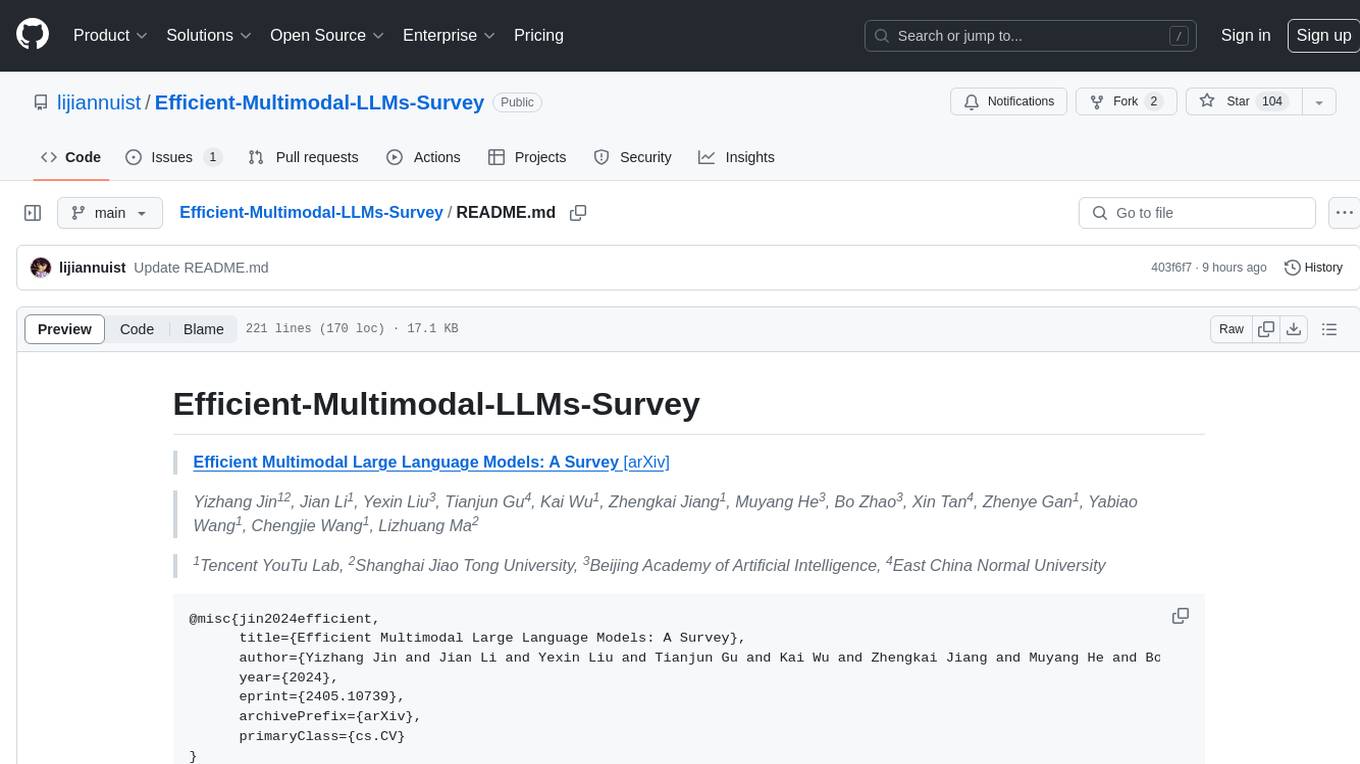
Efficient-Multimodal-LLMs-Survey
Efficient Multimodal Large Language Models: A Survey provides a comprehensive review of efficient and lightweight Multimodal Large Language Models (MLLMs), focusing on model size reduction and cost efficiency for edge computing scenarios. The survey covers the timeline of efficient MLLMs, research on efficient structures and strategies, and applications. It discusses current limitations and future directions in efficient MLLM research.
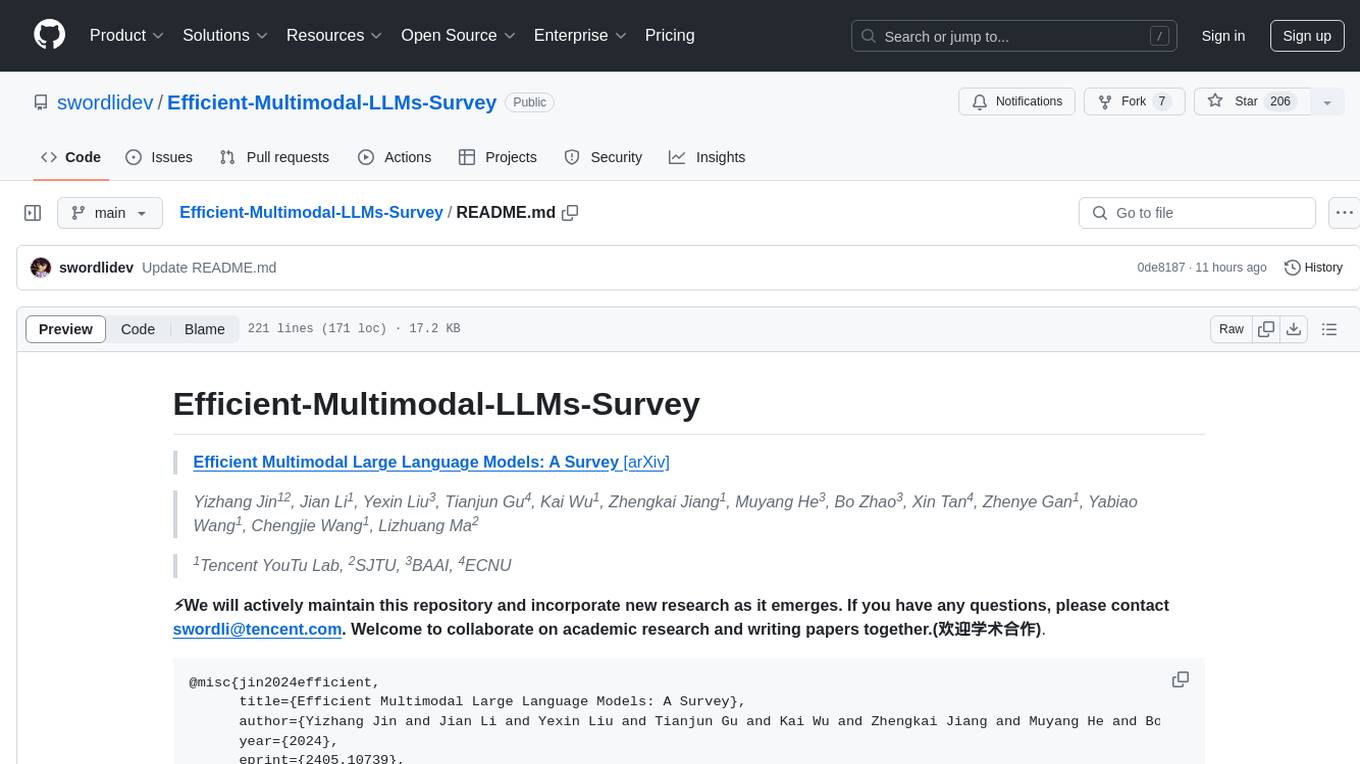
Efficient-Multimodal-LLMs-Survey
Efficient Multimodal Large Language Models: A Survey provides a comprehensive review of efficient and lightweight Multimodal Large Language Models (MLLMs), focusing on model size reduction and cost efficiency for edge computing scenarios. The survey covers the timeline of efficient MLLMs, research on efficient structures and strategies, and their applications, while also discussing current limitations and future directions.
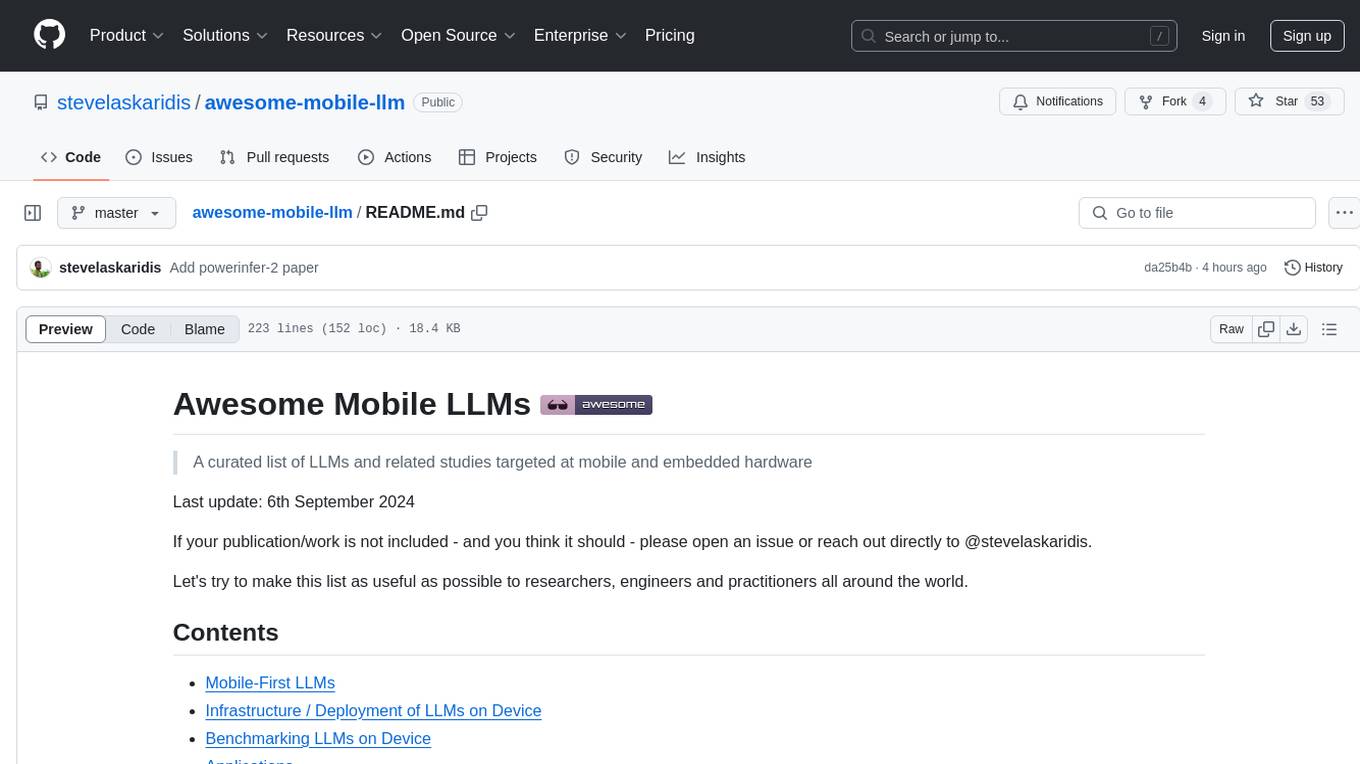
awesome-mobile-llm
Awesome Mobile LLMs is a curated list of Large Language Models (LLMs) and related studies focused on mobile and embedded hardware. The repository includes information on various LLM models, deployment frameworks, benchmarking efforts, applications, multimodal LLMs, surveys on efficient LLMs, training LLMs on device, mobile-related use-cases, industry announcements, and related repositories. It aims to be a valuable resource for researchers, engineers, and practitioners interested in mobile LLMs.
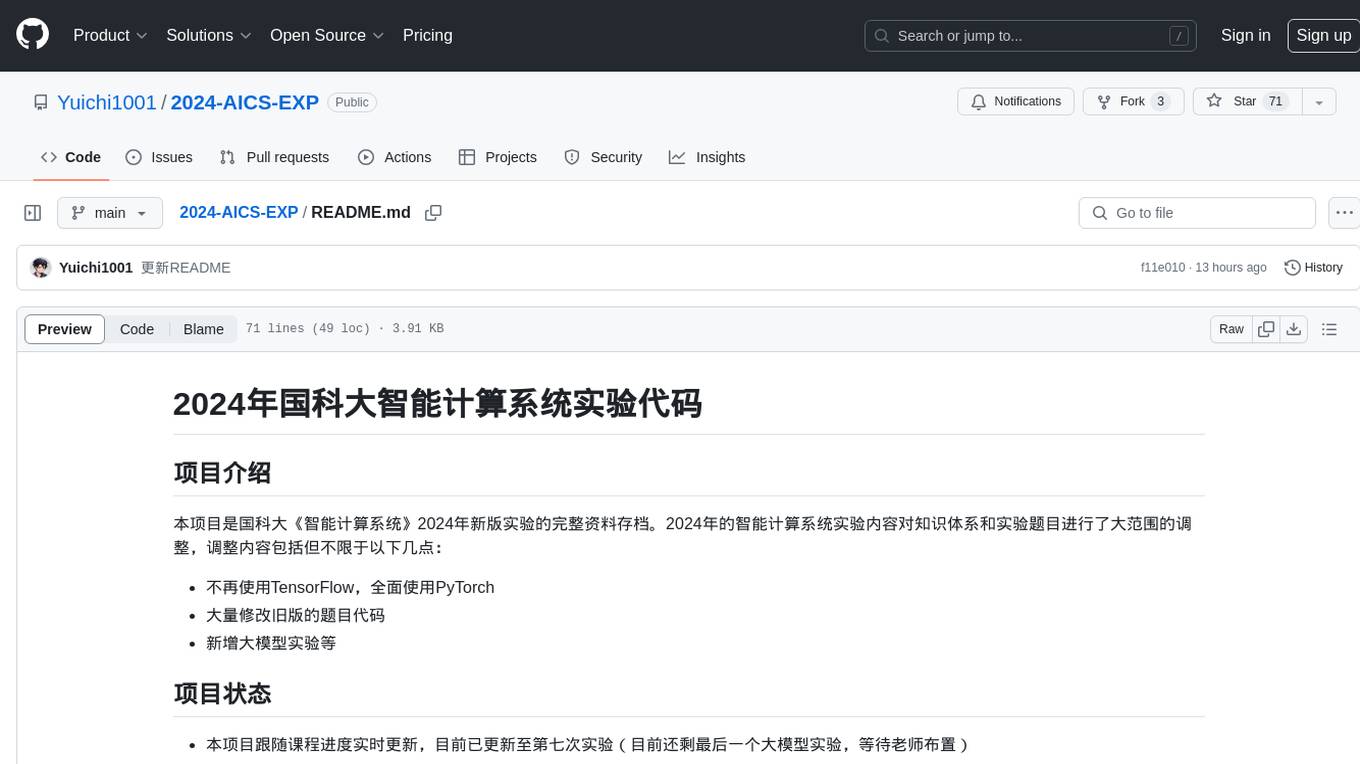
2024-AICS-EXP
This repository contains the complete archive of the 2024 version of the 'Intelligent Computing System' experiment at the University of Chinese Academy of Sciences. The experiment content for 2024 has undergone extensive adjustments to the knowledge system and experimental topics, including the transition from TensorFlow to PyTorch, significant modifications to previous code, and the addition of experiments with large models. The project is continuously updated in line with the course progress, currently up to the seventh experiment. Updates include the addition of experiments like YOLOv5 in Experiment 5-3, updates to theoretical teaching materials, and fixes for bugs in Experiment 6 code. The repository also includes experiment manuals, questions, and answers for various experiments, with some data sets hosted on Baidu Cloud due to size limitations on GitHub.
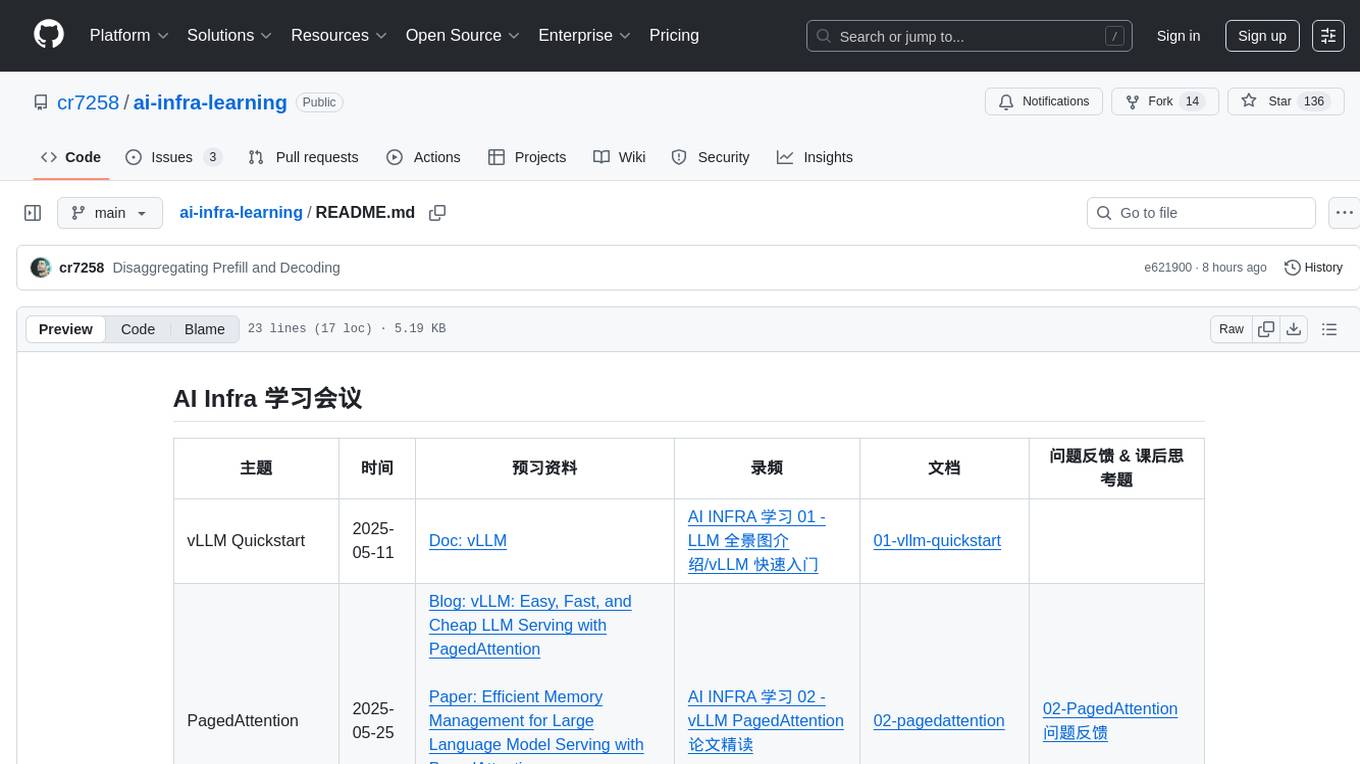
ai-infra-learning
AI Infra Learning is a repository focused on providing resources and materials for learning about various topics related to artificial intelligence infrastructure. The repository includes documentation, papers, videos, and blog posts covering different aspects of AI infrastructure, such as large language models, memory management, decoding techniques, and text generation. Users can access a wide range of materials to deepen their understanding of AI infrastructure and improve their skills in this field.
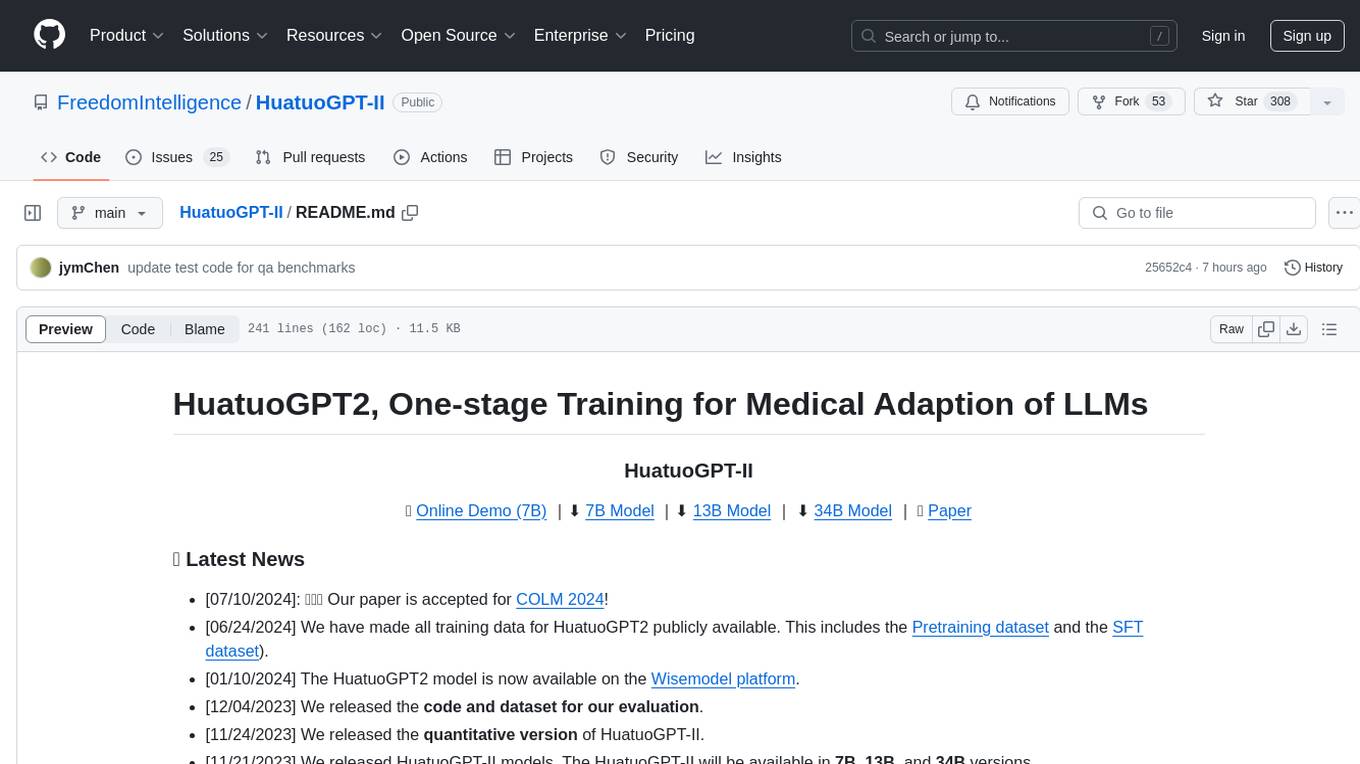
HuatuoGPT-II
HuatuoGPT2 is an innovative domain-adapted medical large language model that excels in medical knowledge and dialogue proficiency. It showcases state-of-the-art performance in various medical benchmarks, surpassing GPT-4 in expert evaluations and fresh medical licensing exams. The open-source release includes HuatuoGPT2 models in 7B, 13B, and 34B versions, training code for one-stage adaptation, partial pre-training and fine-tuning instructions, and evaluation methods for medical response capabilities and professional pharmacist exams. The tool aims to enhance LLM capabilities in the Chinese medical field through open-source principles.
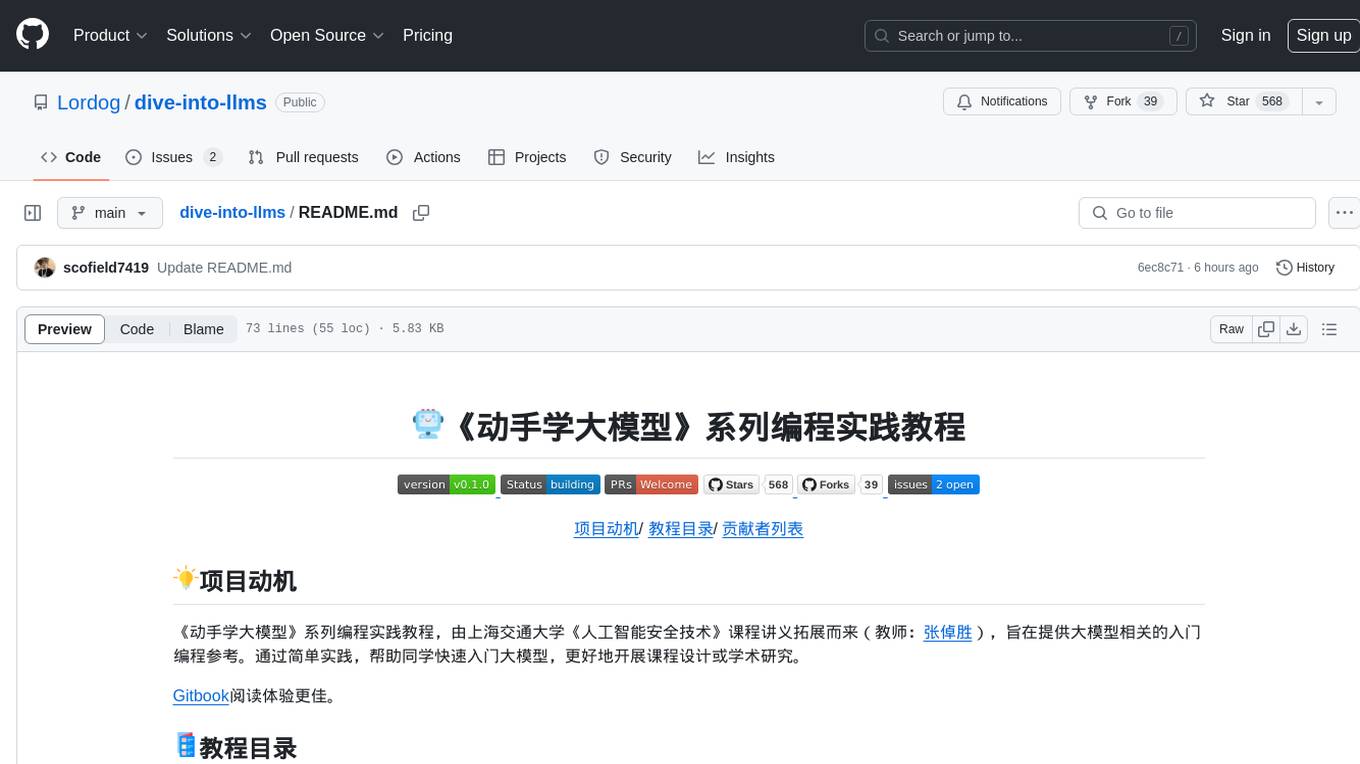
dive-into-llms
The 'Dive into Large Language Models' series programming practice tutorial is an extension of the 'Artificial Intelligence Security Technology' course lecture notes from Shanghai Jiao Tong University (Instructor: Zhang Zhuosheng). It aims to provide introductory programming references related to large models. Through simple practice, it helps students quickly grasp large models, better engage in course design, or academic research. The tutorial covers topics such as fine-tuning and deployment, prompt learning and thought chains, knowledge editing, model watermarking, jailbreak attacks, multimodal models, large model intelligent agents, and security. Disclaimer: The content is based on contributors' personal experiences, internet data, and accumulated research work, provided for reference only.
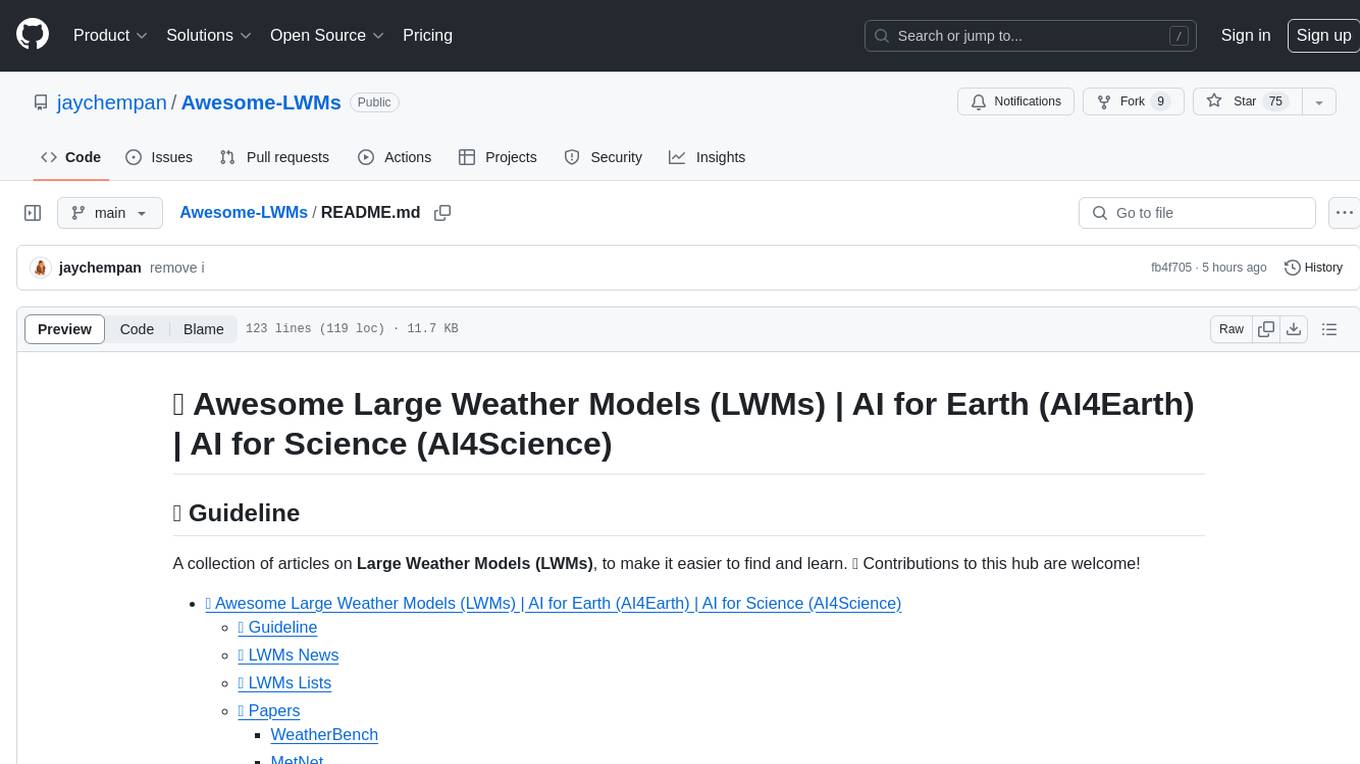
Awesome-LWMs
Awesome Large Weather Models (LWMs) is a curated collection of articles and resources related to large weather models used in AI for Earth and AI for Science. It includes information on various cutting-edge weather forecasting models, benchmark datasets, and research papers. The repository serves as a hub for researchers and enthusiasts to explore the latest advancements in weather modeling and forecasting.
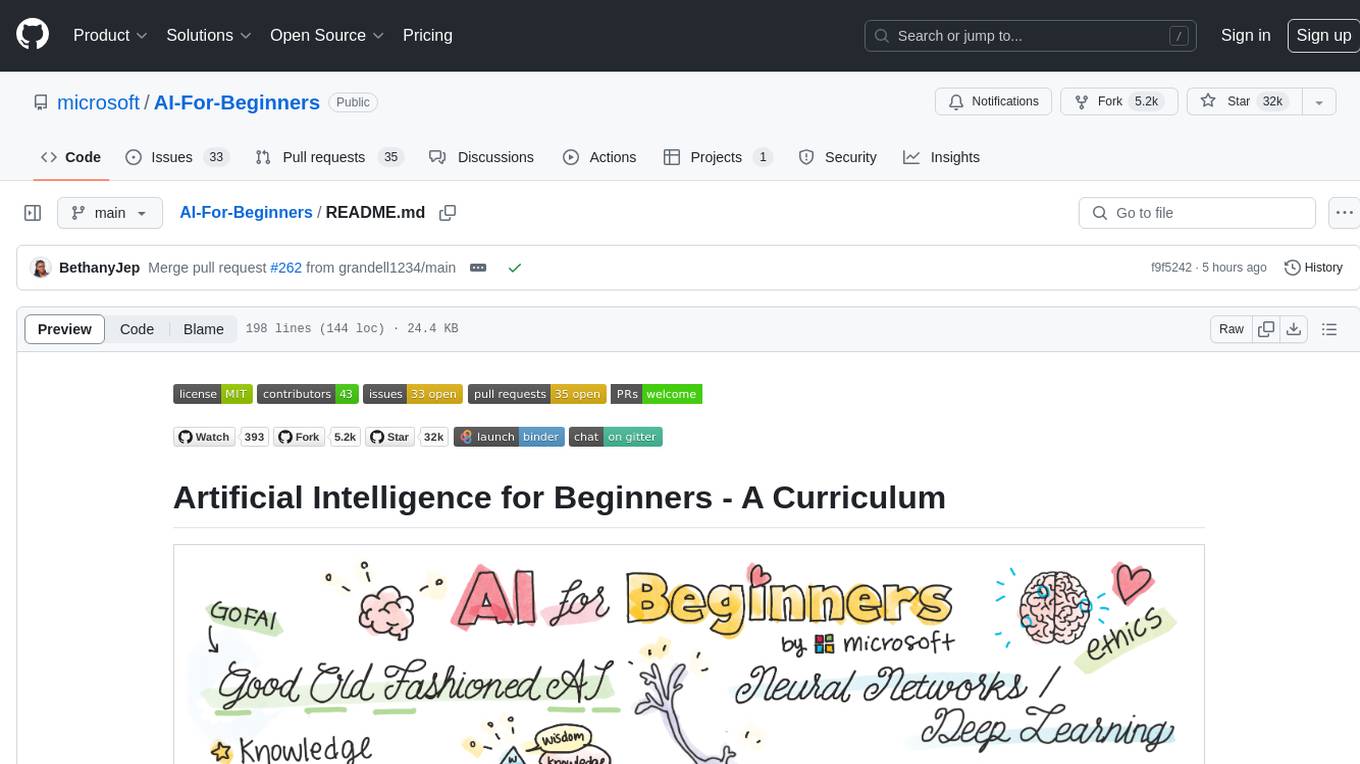
AI-For-Beginners
AI-For-Beginners is a comprehensive 12-week, 24-lesson curriculum designed by experts at Microsoft to introduce beginners to the world of Artificial Intelligence (AI). The curriculum covers various topics such as Symbolic AI, Neural Networks, Computer Vision, Natural Language Processing, Genetic Algorithms, and Multi-Agent Systems. It includes hands-on lessons, quizzes, and labs using popular frameworks like TensorFlow and PyTorch. The focus is on providing a foundational understanding of AI concepts and principles, making it an ideal starting point for individuals interested in AI.
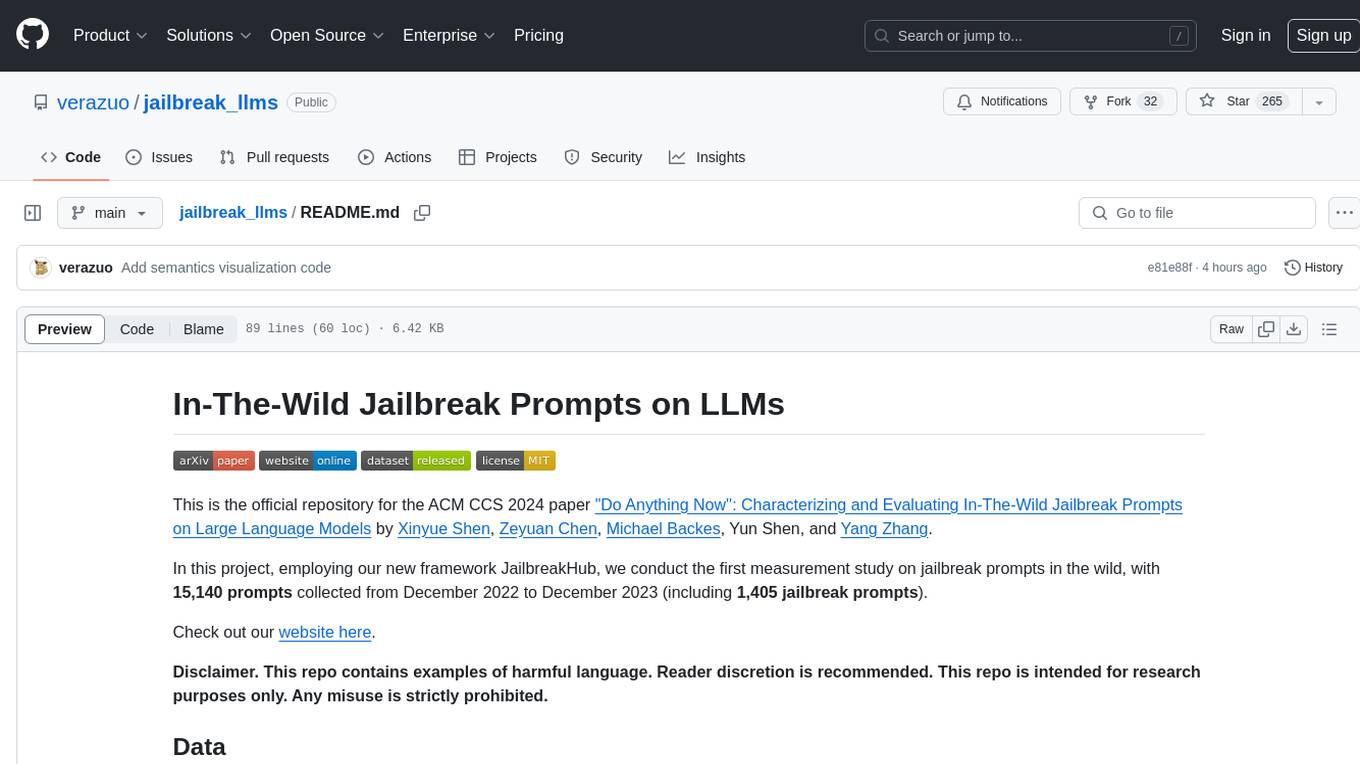
jailbreak_llms
This is the official repository for the ACM CCS 2024 paper 'Do Anything Now': Characterizing and Evaluating In-The-Wild Jailbreak Prompts on Large Language Models. The project employs a new framework called JailbreakHub to conduct the first measurement study on jailbreak prompts in the wild, collecting 15,140 prompts from December 2022 to December 2023, including 1,405 jailbreak prompts. The dataset serves as the largest collection of in-the-wild jailbreak prompts. The repository contains examples of harmful language and is intended for research purposes only.

TrustLLM
TrustLLM is a comprehensive study of trustworthiness in LLMs, including principles for different dimensions of trustworthiness, established benchmark, evaluation, and analysis of trustworthiness for mainstream LLMs, and discussion of open challenges and future directions. Specifically, we first propose a set of principles for trustworthy LLMs that span eight different dimensions. Based on these principles, we further establish a benchmark across six dimensions including truthfulness, safety, fairness, robustness, privacy, and machine ethics. We then present a study evaluating 16 mainstream LLMs in TrustLLM, consisting of over 30 datasets. The document explains how to use the trustllm python package to help you assess the performance of your LLM in trustworthiness more quickly. For more details about TrustLLM, please refer to project website.
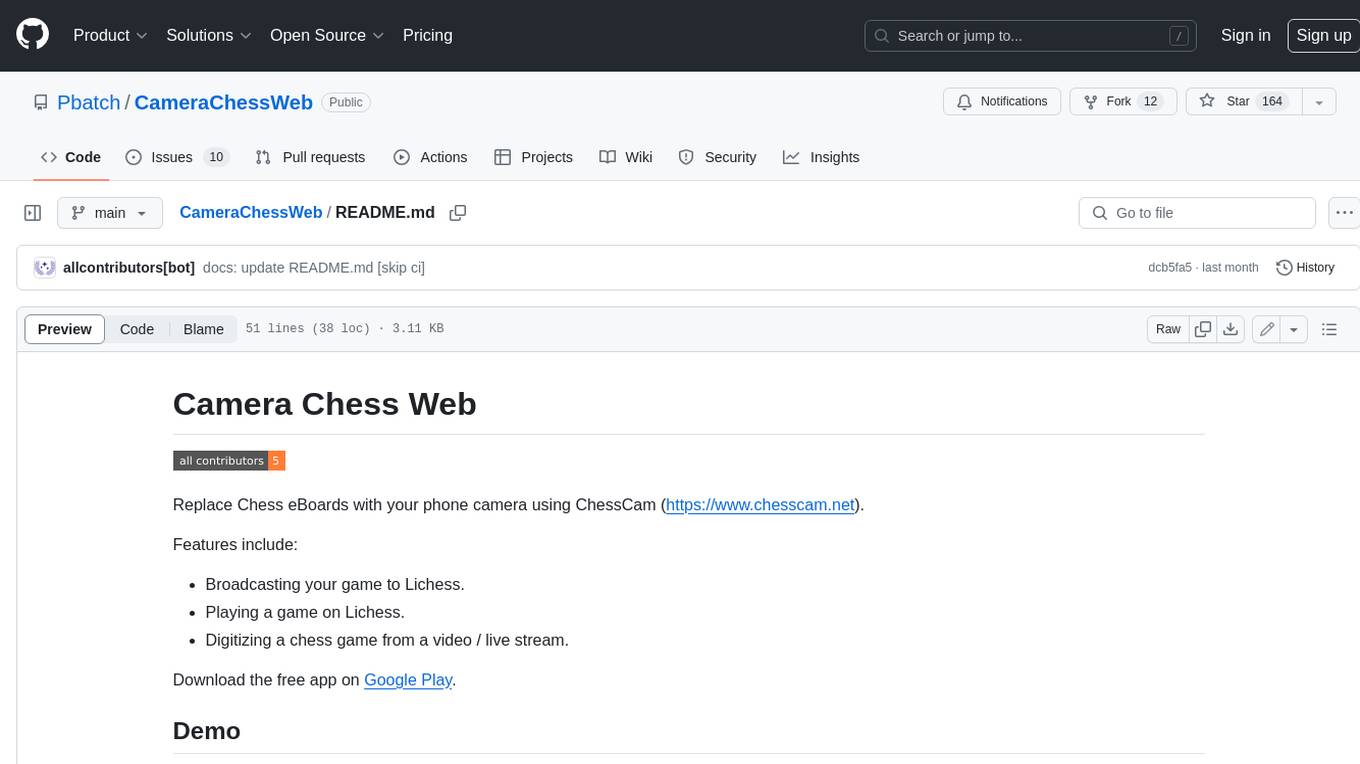
CameraChessWeb
Camera Chess Web is a tool that allows you to use your phone camera to replace chess eBoards. With Camera Chess Web, you can broadcast your game to Lichess, play a game on Lichess, or digitize a chess game from a video or live stream. Camera Chess Web is free to download on Google Play.

tt-metal
TT-NN is a python & C++ Neural Network OP library. It provides a low-level programming model, TT-Metalium, enabling kernel development for Tenstorrent hardware.
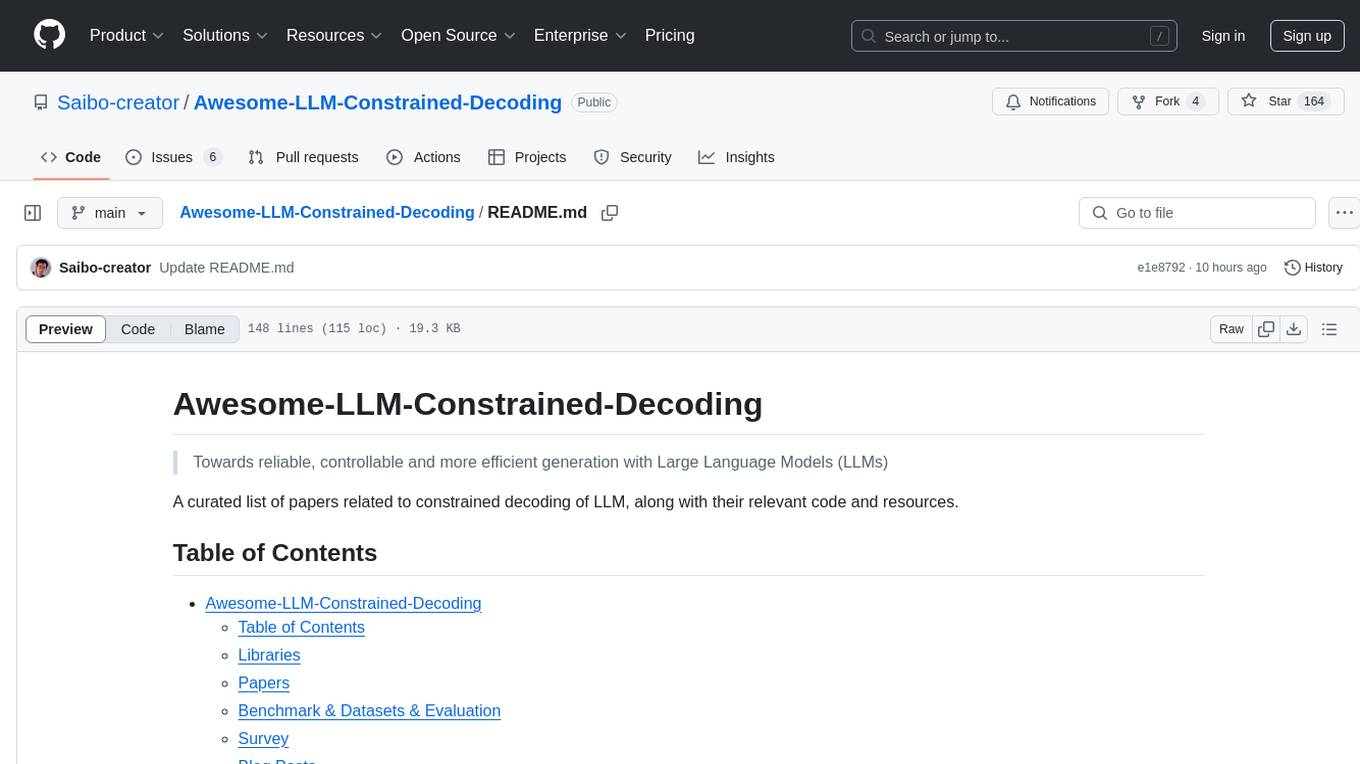
Awesome-LLM-Constrained-Decoding
Awesome-LLM-Constrained-Decoding is a curated list of papers, code, and resources related to constrained decoding of Large Language Models (LLMs). The repository aims to facilitate reliable, controllable, and efficient generation with LLMs by providing a comprehensive collection of materials in this domain.
For similar tasks

Azure-Analytics-and-AI-Engagement
The Azure-Analytics-and-AI-Engagement repository provides packaged Industry Scenario DREAM Demos with ARM templates (Containing a demo web application, Power BI reports, Synapse resources, AML Notebooks etc.) that can be deployed in a customer’s subscription using the CAPE tool within a matter of few hours. Partners can also deploy DREAM Demos in their own subscriptions using DPoC.

sorrentum
Sorrentum is an open-source project that aims to combine open-source development, startups, and brilliant students to build machine learning, AI, and Web3 / DeFi protocols geared towards finance and economics. The project provides opportunities for internships, research assistantships, and development grants, as well as the chance to work on cutting-edge problems, learn about startups, write academic papers, and get internships and full-time positions at companies working on Sorrentum applications.

tidb
TiDB is an open-source distributed SQL database that supports Hybrid Transactional and Analytical Processing (HTAP) workloads. It is MySQL compatible and features horizontal scalability, strong consistency, and high availability.

zep-python
Zep is an open-source platform for building and deploying large language model (LLM) applications. It provides a suite of tools and services that make it easy to integrate LLMs into your applications, including chat history memory, embedding, vector search, and data enrichment. Zep is designed to be scalable, reliable, and easy to use, making it a great choice for developers who want to build LLM-powered applications quickly and easily.

telemetry-airflow
This repository codifies the Airflow cluster that is deployed at workflow.telemetry.mozilla.org (behind SSO) and commonly referred to as "WTMO" or simply "Airflow". Some links relevant to users and developers of WTMO: * The `dags` directory in this repository contains some custom DAG definitions * Many of the DAGs registered with WTMO don't live in this repository, but are instead generated from ETL task definitions in bigquery-etl * The Data SRE team maintains a WTMO Developer Guide (behind SSO)

mojo
Mojo is a new programming language that bridges the gap between research and production by combining Python syntax and ecosystem with systems programming and metaprogramming features. Mojo is still young, but it is designed to become a superset of Python over time.

pandas-ai
PandasAI is a Python library that makes it easy to ask questions to your data in natural language. It helps you to explore, clean, and analyze your data using generative AI.

databend
Databend is an open-source cloud data warehouse that serves as a cost-effective alternative to Snowflake. With its focus on fast query execution and data ingestion, it's designed for complex analysis of the world's largest datasets.
For similar jobs

NanoLLM
NanoLLM is a tool designed for optimized local inference for Large Language Models (LLMs) using HuggingFace-like APIs. It supports quantization, vision/language models, multimodal agents, speech, vector DB, and RAG. The tool aims to provide efficient and effective processing for LLMs on local devices, enhancing performance and usability for various AI applications.
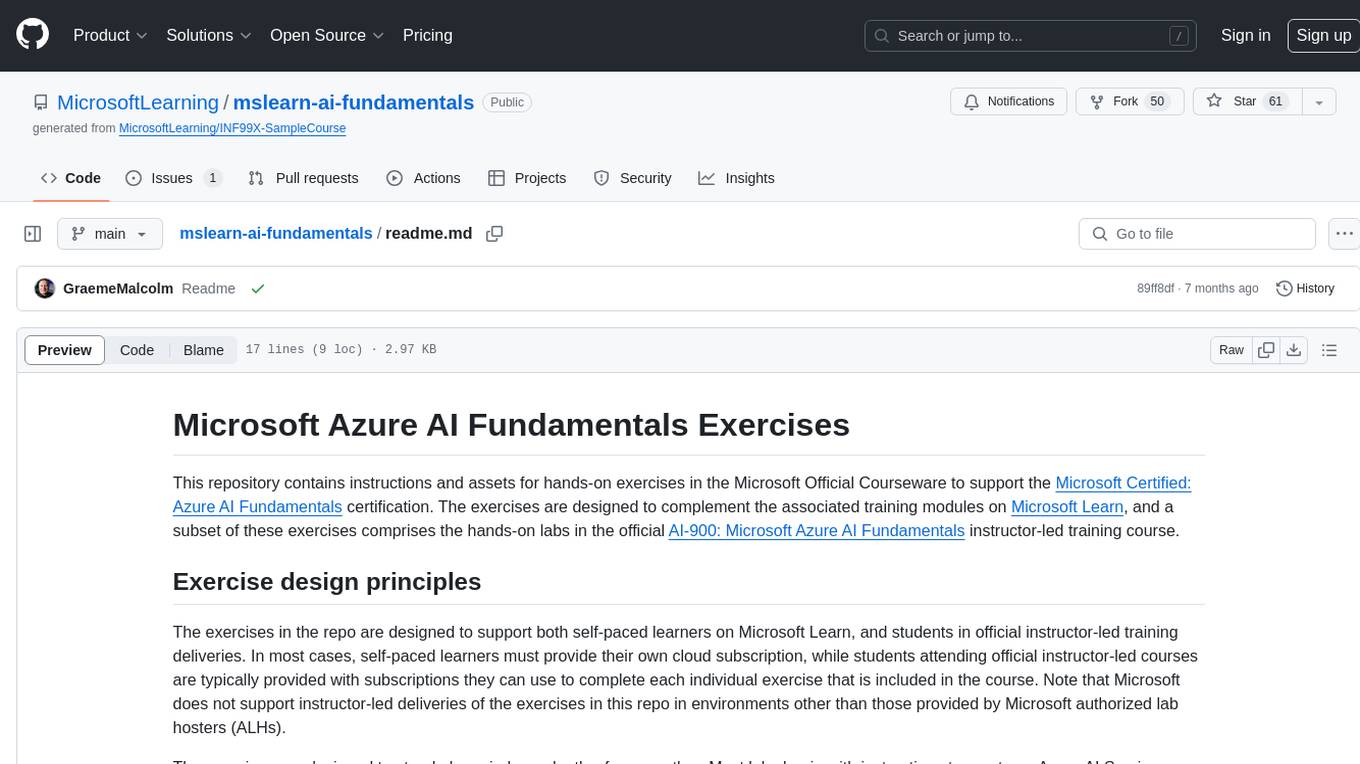
mslearn-ai-fundamentals
This repository contains materials for the Microsoft Learn AI Fundamentals module. It covers the basics of artificial intelligence, machine learning, and data science. The content includes hands-on labs, interactive learning modules, and assessments to help learners understand key concepts and techniques in AI. Whether you are new to AI or looking to expand your knowledge, this module provides a comprehensive introduction to the fundamentals of AI.

awesome-ai-tools
Awesome AI Tools is a curated list of popular tools and resources for artificial intelligence enthusiasts. It includes a wide range of tools such as machine learning libraries, deep learning frameworks, data visualization tools, and natural language processing resources. Whether you are a beginner or an experienced AI practitioner, this repository aims to provide you with a comprehensive collection of tools to enhance your AI projects and research. Explore the list to discover new tools, stay updated with the latest advancements in AI technology, and find the right resources to support your AI endeavors.
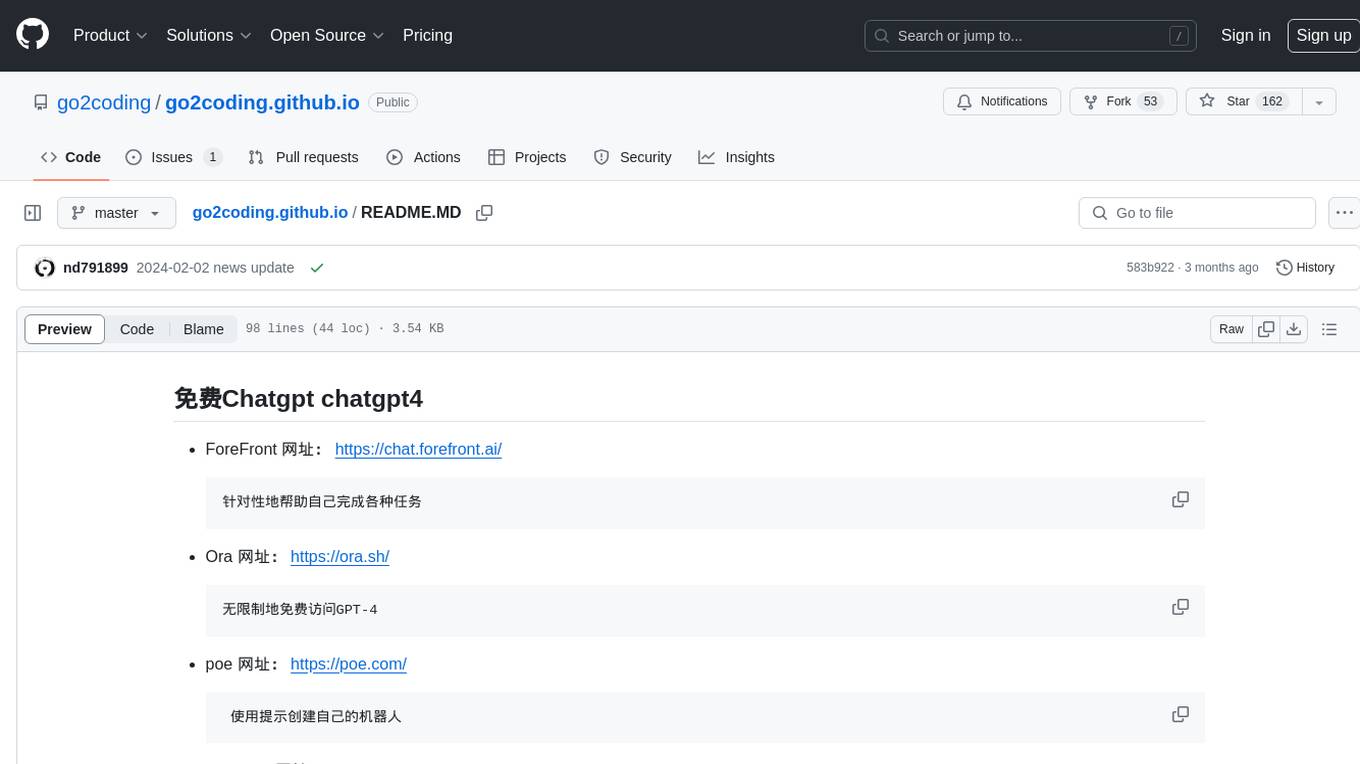
go2coding.github.io
The go2coding.github.io repository is a collection of resources for AI enthusiasts, providing information on AI products, open-source projects, AI learning websites, and AI learning frameworks. It aims to help users stay updated on industry trends, learn from community projects, access learning resources, and understand and choose AI frameworks. The repository also includes instructions for local and external deployment of the project as a static website, with details on domain registration, hosting services, uploading static web pages, configuring domain resolution, and a visual guide to the AI tool navigation website. Additionally, it offers a platform for AI knowledge exchange through a QQ group and promotes AI tools through a WeChat public account.
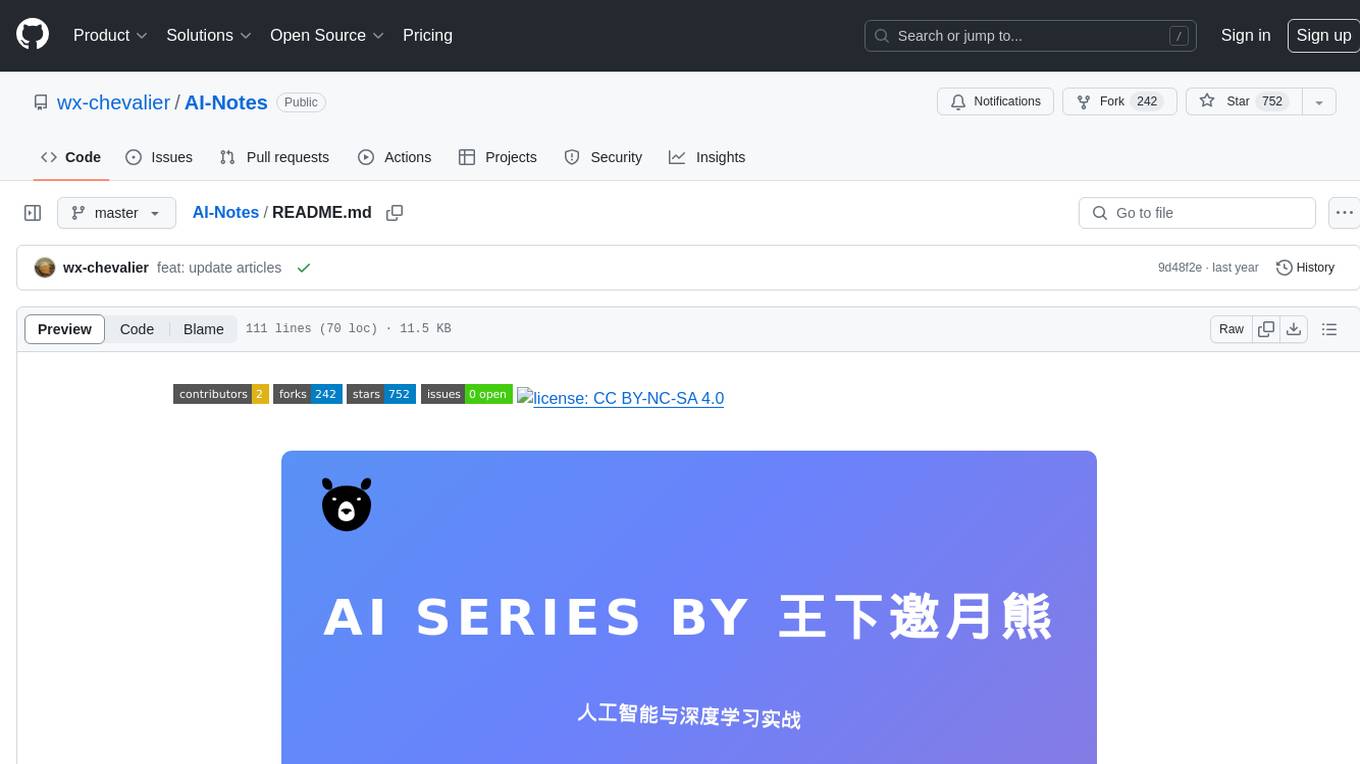
AI-Notes
AI-Notes is a repository dedicated to practical applications of artificial intelligence and deep learning. It covers concepts such as data mining, machine learning, natural language processing, and AI. The repository contains Jupyter Notebook examples for hands-on learning and experimentation. It explores the development stages of AI, from narrow artificial intelligence to general artificial intelligence and superintelligence. The content delves into machine learning algorithms, deep learning techniques, and the impact of AI on various industries like autonomous driving and healthcare. The repository aims to provide a comprehensive understanding of AI technologies and their real-world applications.
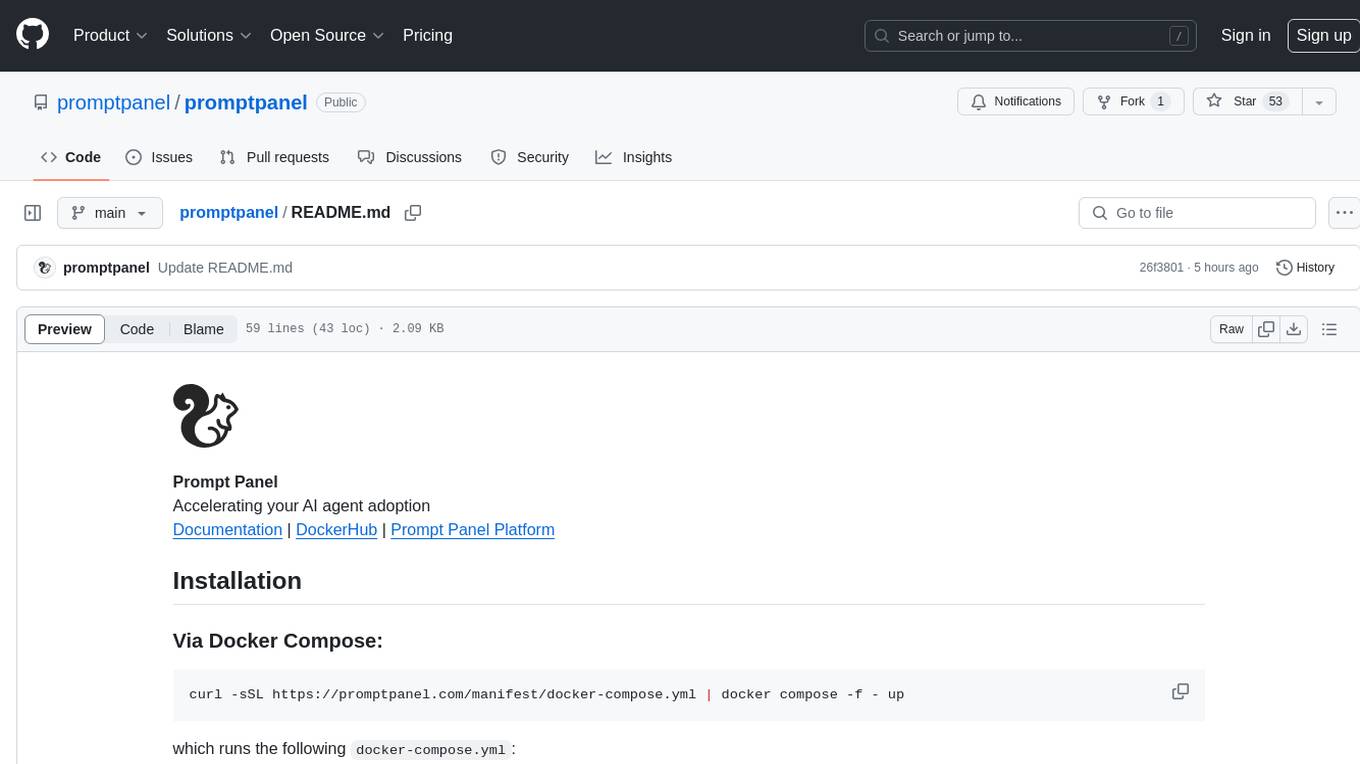
promptpanel
Prompt Panel is a tool designed to accelerate the adoption of AI agents by providing a platform where users can run large language models across any inference provider, create custom agent plugins, and use their own data safely. The tool allows users to break free from walled-gardens and have full control over their models, conversations, and logic. With Prompt Panel, users can pair their data with any language model, online or offline, and customize the system to meet their unique business needs without any restrictions.
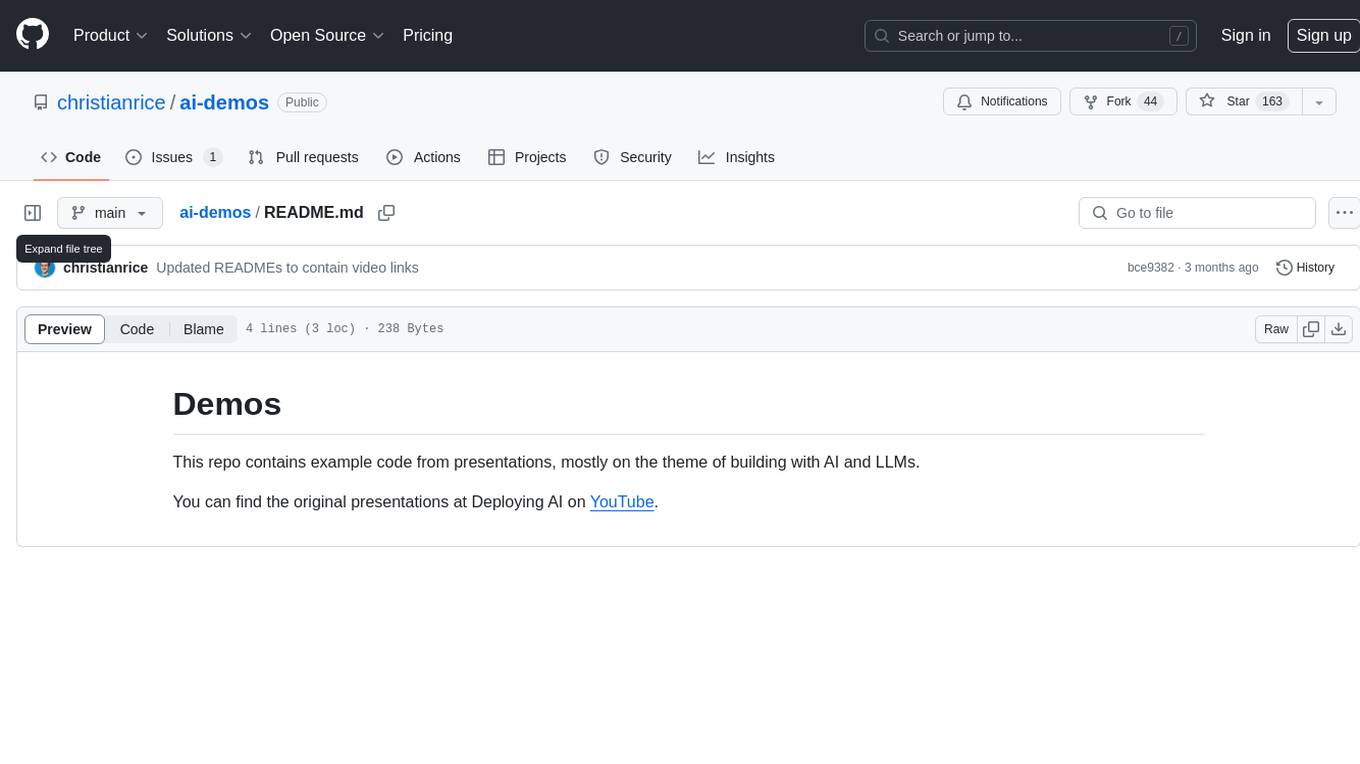
ai-demos
The 'ai-demos' repository is a collection of example code from presentations focusing on building with AI and LLMs. It serves as a resource for developers looking to explore practical applications of artificial intelligence in their projects. The code snippets showcase various techniques and approaches to leverage AI technologies effectively. The repository aims to inspire and educate developers on integrating AI solutions into their applications.
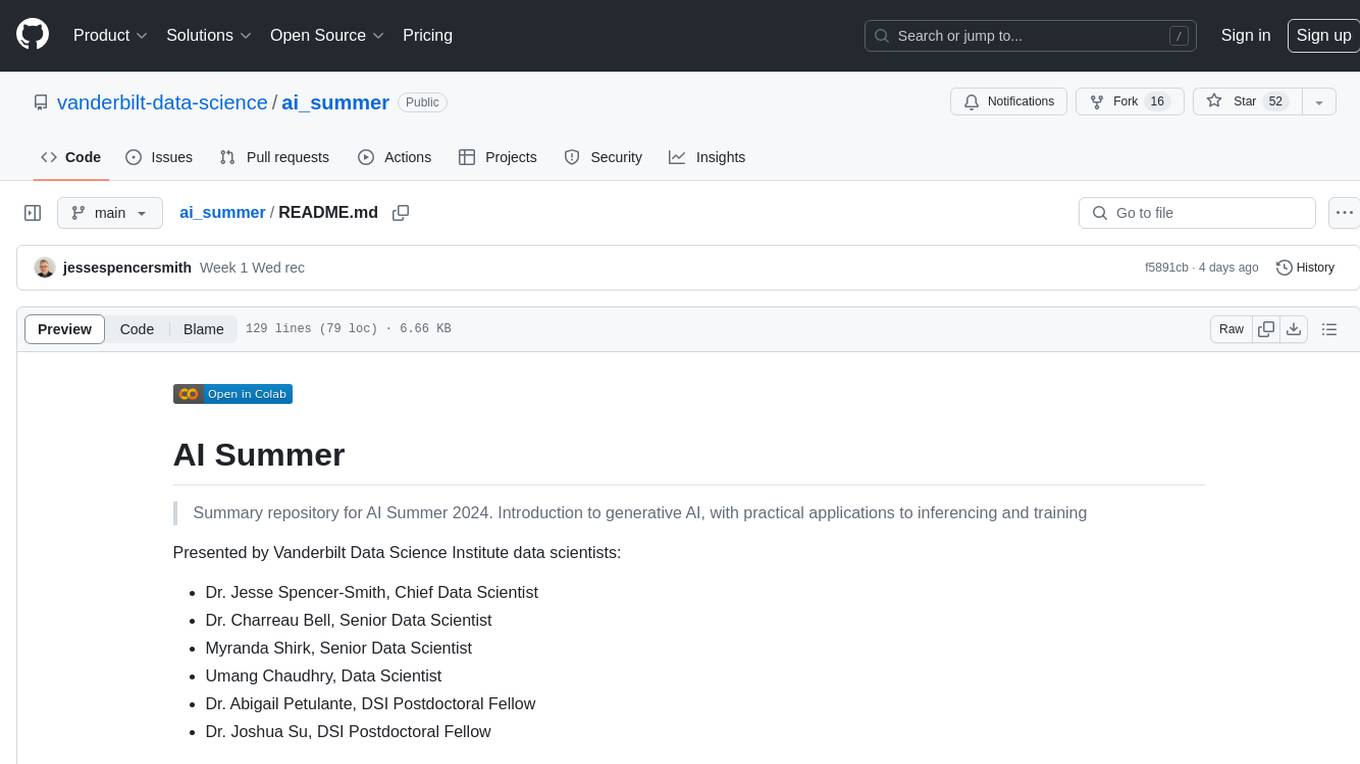
ai_summer
AI Summer is a repository focused on providing workshops and resources for developing foundational skills in generative AI models and transformer models. The repository offers practical applications for inferencing and training, with a specific emphasis on understanding and utilizing advanced AI chat models like BingGPT. Participants are encouraged to engage in interactive programming environments, decide on projects to work on, and actively participate in discussions and breakout rooms. The workshops cover topics such as generative AI models, retrieval-augmented generation, building AI solutions, and fine-tuning models. The goal is to equip individuals with the necessary skills to work with AI technologies effectively and securely, both locally and in the cloud.
